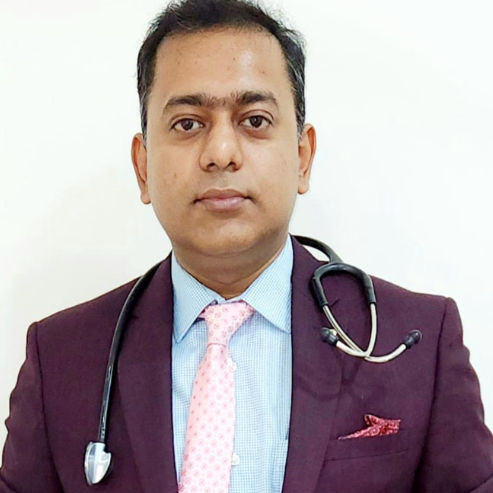Adenomyosis Symptoms, Causes, Diagnosis and Treatment
Know about adenomyosis, what it is, symptoms, causes, diagnosis, treatment options and management with treatment of adenomyosis.


Introduction
Adenomyosis is a common but often misunderstood condition that affects many women, especially those in their 30s and 40s. If you or someone you know has been diagnosed with adenomyosis or is experiencing symptoms, this article will help you understand the condition, its causes, and how it can be managed effectively.
What is Adenomyosis?
Adenomyosis occurs when the tissue that normally lines the uterus (endometrium) grows into the muscular wall of the uterus (myometrium). This can cause the uterus to become enlarged, leading to painful and heavy periods. While it is not life-threatening, adenomyosis can significantly impact a woman’s quality of life.
Consult an Oncologist for Personalised Advice
Symptoms of Adenomyosis
The symptoms of adenomyosis can vary from mild to severe. Some women may not experience any symptoms, while others may have:
- Heavy or prolonged menstrual bleeding (menorrhagia)
- Severe menstrual cramps (dysmenorrhea)
- Chronic pelvic pain
- Pain during intercourse (dyspareunia)
- Bloating or pressure in the lower abdomen
- Enlarged uterus (sometimes noticeable during a pelvic exam)
If you experience these symptoms, it’s important to consult a doctor for proper diagnosis and treatment.
What Causes Adenomyosis?
The exact cause of adenomyosis is still unclear, but several factors may contribute to its development:
- Hormonal imbalances – Estrogen may play a role in stimulating the growth of endometrial tissue.
- Childbirth or uterine surgery – Previous uterine procedures (like C-sections or fibroid removal) may increase the risk.
- Inflammation – Some researchers believe inflammation from childbirth or surgery may trigger abnormal tissue growth.
- Age – Adenomyosis is more common in women aged 35-50, though it can occur in younger women as well.
How is Adenomyosis Diagnosed?
Since adenomyosis symptoms can resemble other conditions like endometriosis or fibroids, a proper diagnosis is essential. Your doctor may use one or more of the following methods:
1. Pelvic Exam – To check for an enlarged or tender uterus.
2. Ultrasound – A transvaginal ultrasound can help detect thickening of the uterine wall.
3. MRI (Magnetic Resonance Imaging) – Provides detailed images of the uterus to confirm adenomyosis.
4. Biopsy – In rare cases, a small tissue sample may be taken for examination.
If you suspect you have adenomyosis, booking a consultation with a specialist can help you get the right diagnosis and treatment plan.
Treatment Options for Adenomyosis
Treatment depends on the severity of symptoms and whether you plan to have children in the future. Options include:
1. Medications
- Pain relievers – Over-the-counter NSAIDs (like ibuprofen) can help reduce pain and inflammation.
- Hormonal therapies – Birth control pills, hormonal IUDs, or GnRH agonists may help regulate periods and reduce symptoms.
2. Minimally Invasive Procedures
- Uterine artery embolisation – Blocks blood flow to the affected tissue, shrinking it.
- Endometrial ablation – Destroys the uterine lining to reduce heavy bleeding (not suitable for women who want to conceive).
3. Surgery
- Hysterectomy – Removal of the uterus is the only permanent cure, recommended for severe cases when other treatments fail.
Lifestyle and Home Remedies
While medical treatment is often necessary, some lifestyle changes can help manage symptoms:
- Heat therapy – A warm bath or heating pad can ease cramps.
- Regular exercise – Helps reduce inflammation and improve blood circulation.
- Dietary changes – Eating anti-inflammatory foods (like leafy greens, nuts, and omega-3-rich fish) may help.
- Stress management – Yoga, meditation, or deep breathing exercises can reduce pain perception.
When to See a Doctor?
If you experience:
- Severe pain that disrupts daily life
- Excessively heavy periods
- Symptoms that worsen over time
It’s important to seek medical advice. Early diagnosis can help manage symptoms effectively and improve your quality of life.
Final Thoughts
Adenomyosis can be challenging, but with the right treatment and lifestyle adjustments, many women find relief. If you suspect you have adenomyosis, don’t hesitate to consult a healthcare provider for personalised care.
Consult an Oncologist for Personalised Advice
Consult an Oncologist for Personalised Advice

Dr Sunita Samleti
Oncologist
18 Years • M.D. (Pathology)- TN Medical College, Mumbai University, Mumbai, Mar 2005 M.B.B.S. Grant Medical College, Mumbai University, Mumbai, Oct 1999
Chinagadila
Apollo Hospitals Health City Unit, Chinagadila

Dr. Gopal Kumar
Head, Neck and Thyroid Cancer Surgeon
15 Years • MBBS, MS , FARHNS ( Seoul, South Korea ), FGOLF ( MSKCC, New York )
Delhi
Apollo Hospitals Indraprastha, Delhi
(25+ Patients)

Dr. Rupam Manna
Radiation Specialist Oncologist
4 Years • MBBS MD(RADIO THERAPY)
Barasat
Diab-Eat-Ease, Barasat

Dr.sanchayan Mandal
Oncologist
17 Years • MBBS, DrNB( MEDICAL ONCOLOGY), DNB (RADIOTHERAPY),ECMO. PDCR. ASCO
Kolkata
Dr. Sanchayan Mandal Oncology Clinic, Kolkata
Dr. B Shravanthi Reddy
Radiation Specialist Oncologist
8 Years • MBBS, DNB(Radiation Oncology)
Manikonda Jagir
Apollo Clinic, Manikonda, Manikonda Jagir
Consult an Oncologist for Personalised Advice

Dr Sunita Samleti
Oncologist
18 Years • M.D. (Pathology)- TN Medical College, Mumbai University, Mumbai, Mar 2005 M.B.B.S. Grant Medical College, Mumbai University, Mumbai, Oct 1999
Chinagadila
Apollo Hospitals Health City Unit, Chinagadila

Dr. Gopal Kumar
Head, Neck and Thyroid Cancer Surgeon
15 Years • MBBS, MS , FARHNS ( Seoul, South Korea ), FGOLF ( MSKCC, New York )
Delhi
Apollo Hospitals Indraprastha, Delhi
(25+ Patients)

Dr. Rupam Manna
Radiation Specialist Oncologist
4 Years • MBBS MD(RADIO THERAPY)
Barasat
Diab-Eat-Ease, Barasat

Dr.sanchayan Mandal
Oncologist
17 Years • MBBS, DrNB( MEDICAL ONCOLOGY), DNB (RADIOTHERAPY),ECMO. PDCR. ASCO
Kolkata
Dr. Sanchayan Mandal Oncology Clinic, Kolkata
Dr. B Shravanthi Reddy
Radiation Specialist Oncologist
8 Years • MBBS, DNB(Radiation Oncology)
Manikonda Jagir
Apollo Clinic, Manikonda, Manikonda Jagir